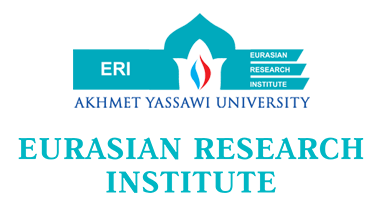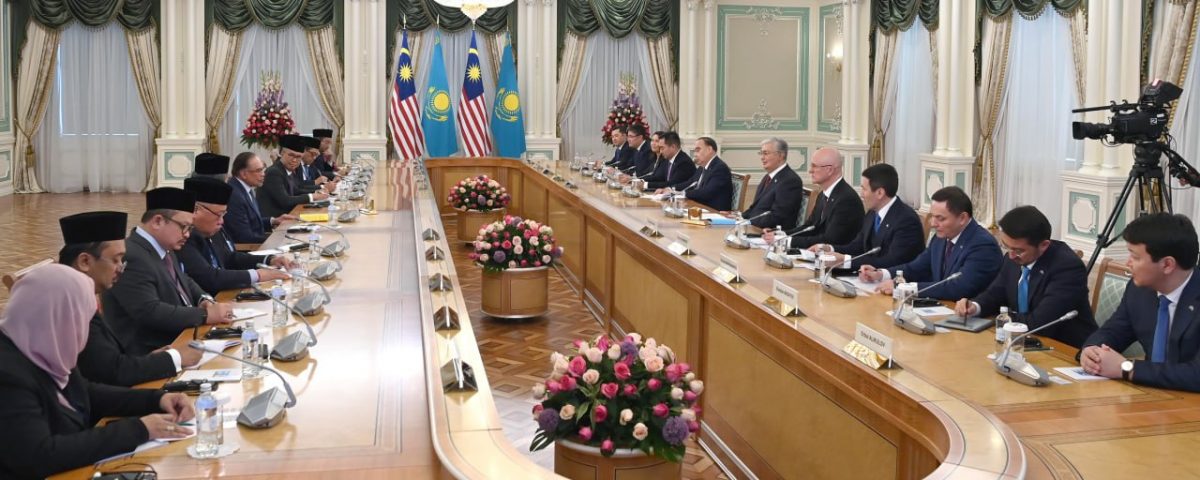Malaysia’s Prime Minister Dato’ Seri Anwar Ibrahim made his Central Asian tour to Kyrgyzstan, Kazakhstan, and Uzbekistan from 15 to 19 May 2024 to enhance cooperation opportunities. He was followed by a large delegation consisting of Minister of Foreign Affairs Dato’ Seri Utama Haji Mohamad bin Haji Hassan; Minister of International Trade and Industry Senator Tengku Dato’ Seri Utama Zafrul Tengku Abdul Aziz; Minister of Tourism, Arts and Culture Dato’ Sri Tiong King Sing and Minister in the Prime Minister’s Department (Religious Affairs) Senator Dato’ Setia Dr Haji Mohd Na’im Mokhtar [Putrajaya, 2024].
The visit by such an extensive delegation demonstrated an interest in fostering political and economic cooperation between Malaysia and its Central Asian partners, while also emphasizing the significance of the region in connecting Eurasian links amid the changing nature of international relations and the world economy. It also signified the intention of extending practical cooperation where the Malaysian business community could reach agreements on the spot with their Central Asian partners.
Malaysia is currently grappling with the challenges typical of middle-income democracies, such as the demand to strengthen the rule of law, reduce the state’s economic role, and combat patronage politics, in addition to clashing with the political authority. When the current Prime Minister, Anwar Ibrahim, came to power in 2022, one of the major promises of his party’s political campaign was to bring reform to the Malaysian government and economy [East Asia Forum, 2024]. In line with the need for reforms, the Malaysian government outlined several initiatives in 2023 to address its declining export value amidst the current economic challenges. There, the diversification of export destinations to Central Asian and Latin American countries was highlighted among the prospective ones [Ibrahim, et.al., 2023].
The visit was thus the follow-up strategy of reconsideration of Malaysian politics. During the negotiations in Central Asia, Prime Minister Anwar prioritized expanding cooperation across political, trade, economic, investment, and humanitarian spheres.
The Malaysian delegation commenced their tour in Kyrgyzstan, engaging in high-level meetings with the Kyrgyz president and cabinet of ministers. A significant outcome of these discussions was the revival of the Special Kyrgyz-Malaysian Joint Commission, initially established in 1997 but suspended in the 2010s. This renewed cooperation is expected to enhance political ties and economic collaboration between the two nations. Additionally, negotiations to establish direct flights between Bishkek and Kuala Lumpur are anticipated to further facilitate business and personal exchanges. Both parties also emphasized the importance of education as a cornerstone of cultural and humanitarian cooperation [Cabinet of Ministers of the Kyrgyz Republic, 2024]. As part of the two-day visit, a Malaysian delegation visited the indigenous community’s craft and wares exhibit at Ala Archa National Park.
Further, the Malaysian delegation headed to Kazakhstan. There, they had a meeting with President Kassym-Jomart Tokayev in an expanded format; together with the head of the government of Kazakhstan, Olzhas Bektenov, they had a Kazakhstan-Malaysian investment round table with the participation of representatives of business communities and academia from the two countries. The discussions resulted in signing contracts worth more than $350 million, while attracting investment in Islamic finance and trade development, as well as in food processing, mining, gold processing, and joint production of transformer and automotive oil, were emphasized among the prospective cooperation areas [Akorda, 2024].
It is worth mentioning that Kazakhstan is Malaysia’s largest trading partner in Central Asia. Since 2014, the two countries have been operating within a “comprehensive partnership” framework, which has significantly strengthened their economic and diplomatic ties. Over the past year, bilateral trade turnover increased from $150 million to nearly $245 million, with the ambitious goal of surpassing $650 million in volume. Currently, 48 companies with Malaysian capital are operating in Kazakhstan, while investment projects totaling over $410 million have been executed through 17 joint ventures [Prime Minister.kz, 2024]. In prospect, both sides are eager to enhance trade by shifting from raw materials to higher-value products, as well as interested in expanding Muslim-friendly tourism and the agro-food sectors.
The Malaysian delegation concluded their Central Asian tour in Uzbekistan, visiting Tashkent, Samarkand, and Bukhara cities. The visit began with official negotiations focusing on expanding Uzbek-Malaysian cooperation, as well as strengthening the political dialogue between the two nations. Then the High-Level Uzbekistan-Malaysian Business Forum was organized in Samarkand to expand investment and cooperation opportunities. To streamline common efforts, both parties agreed to transform the existing joint Trade Committee into an Intergovernmental Commission, with its inaugural meeting scheduled for later this year. Additionally, the Uzbek government expressed their readiness to establish an Uzbek-Malaysian industrial zone in Uzbekistan [President.uz, 2024].
Meanwhile, Uzbek-Malaysian business ties have been strengthening, as evidenced by a trade turnover that more than doubled in 2023, exceeding $94 million. The frequency of flights between Tashkent and Kuala Lumpur is also increasing. Additionally, there was a proposal to establish a dialogue platform for foreign ministers in the “Central Asia + ASEAN” format. Overall, a joint statement was issued, affirming the commitment to deepen multifaceted cooperation between the two nations [Gazeta.uz, 2024].
In addition to interstate relations, the Malaysian parliament regularly cooperates with Central Asian parliamentarians through established Parliamentary Friendship Groups. Malaysia also works with Central Asian countries within international organizations such as the Conference on Collaborating Interaction and Confidence Building Measures in Asia (CICA) and the Organisation of Islamic Cooperation (OIC).
In retrospect, Malaysia’s cooperation with Central Asian states began in the early 1990s. Prior to the current tour, Malaysia’s Prime Minister visited Kazakhstan in 1996, 2011, and 2014; Kyrgyzstan in 1996 and 1997; and Uzbekistan in 1993 and 2008. In addition to these visits, Malaysian politicians, including Ministers of Foreign Affairs, Deputy Prime Ministers, and other high-level delegations, have frequently visited Central Asia. These political consultations serve as a crucial mechanism for promoting and strengthening relations.
Malaysia, as a major producer of halal food products, is eager to expand its presence in the Central Asian market. Central Asian businesses, in turn, are interested in adopting Malaysian technology for producing halal goods. The agricultural sector represents another significant area for collaboration. Prime Minister Anwar Ibrahim looked at collaborations that would capitalize on Malaysia’s know-how in sustainable farming methods and agricultural technologies. Such partnerships can create new opportunities for Malaysian agricultural experts while also assisting in the improvement of agricultural output in Central Asia.
Islamic finance is another promising field highly valued by Central Asian partners. Central Asian financiers greatly respect Malaysia’s leadership in Islamic banking and finance on a global scale. Therefore, Malaysia’s best practices and experience in Islamic finance may assist Central Asian nations in creating their own Islamic banking industries.
Malaysia, as one of the major ICT players in Southeast Asia, is in a good position to support Central Asia in developing their technology capacities. Talks about promoting ICT cooperation with an emphasis on digital infrastructure, cybersecurity, and innovation were part of the Malaysian delegation’s agenda.
Tourism and education also represent vital spheres of cooperation between the regions. Malaysia is interested in strengthening its tourist ties in Central Asia in order to foster interpersonal relationships and cross-cultural exchanges. Educational collaboration was deliberated, with the objective of augmenting academic alliances, scholarships, and student exchange initiatives.
As an important country in Southeast Asia and a founding member of the Association of Southeast Asian Nations (ASEAN), Malaysia is important for Central Asia in enhancing connections with Southeast Asia. Malaysia also plays a significant role in the U.S.-China strategic competition in the region, further underscoring its geopolitical importance. Malaysia’s engagement with Central Asia can thus be seen as part of a broader strategy to enhance its geopolitical influence and ensure its position in Eurasian affairs.
For Central Asian states, economic and agricultural cooperation, Islamic finance, ICT development, tourism, and education, which were among the major themes of negotiations, could open new horizons of cooperation with Southeast Asia.
References:
Akorda (2024). The President held talks with Prime Minister of Malaysia Anwar Ibrahim. Retrieved from https://www.akorda.kz/ru/prezident-provel-peregovory-s-premer-ministrom-malayzii-anvarom-ibragimom-1645111. Accessed on 17.06.2024.
Cabinet of Ministers of the Kyrgyz Republic (2024). Akylbek Japarov: The historic visit of Malaysian Prime Minister Anwar Ibrahim to Kyrgyzstan is the starting point for the resumption of active cooperation between the two countries. Retrieved from https://www.gov.kg/ru/post/s/24210-akylbek-zaparov-malaiziyanyn-premer-ministri-anvar-ibragimdin-kyrgyzstanga-bolgon-taryxyi-sapary-eki-olkonun-ortosundagy-kyzmattasuunu-kairadan-zandantat. Accessed on 17.06.2024.
East Asia Forum (2024). Malaysia’s economic reform still caught in the baggage of the old politics. Retrieved from https://eastasiaforum.org/2024/01/29/Malaysias-Economic-Reform-Still-Caught-In-The-Baggage-Of-The-Old-Politics/. Accessed on 14.06.2024.
Gazeta.uz (2024). Uzbekistan and Malaysia agreed to deepen multifaceted cooperation. Retrieved from https://www.gazeta.uz/ru/2024/05/17/talks/. Accessed on 17.06.2024.
Ibrahim, Junaid, Carvalho, Martin, Vethasalam, Ragananthini, and Lee, Benjamin (2023). Malaysia targets Central Asian and Latin American markets to address declining export value, says PM. Retrieved from https://www.thestar.com.my/news/nation/2023/10/31/malaysia-targets-central-asian-and-latin-american-markets-to-address-declining-export-value-says-pm. Accessed on 14.06.2024.
President.uz (2024). The President of Uzbekistan and the Prime Minister of Malaysia noted the importance of bringing bilateral relations to a qualitatively new level. Retrieved from https://president.uz/ru/lists/view/7243. Accessed on 17.06.2024.
Prime Minister.kz (2024). Kazakhstan-Malaysia investment roundtable: Agreements on joint projects signed. Retrieved from https://primeminister.kz/en/news/kazakhstan-malaysia-investment-roundtable-agreements-on-joint-projects-signed-28370. Accessed on 17.06.2024.
Putrajaya (2024). Official visit of Prime Minister Dato’ Seri Anwar Ibrahim to the Kyrgyz Republic, Kazakhstan and Uzbekistan 15 – 19 May 2024. Retrieved from https://www.kln.gov.my/web/guest/-/official-visit-of-prime-minister-dato-seri-anwar-ibrahim-to-the-kyrgyz-republic-kazakhstan-and-uzbekistan-15-19-may-2024. Accessed on 12.06.2024.
Note: The views expressed in this blog are the author’s own and do not necessarily reflect the Institute’s editorial policy.

